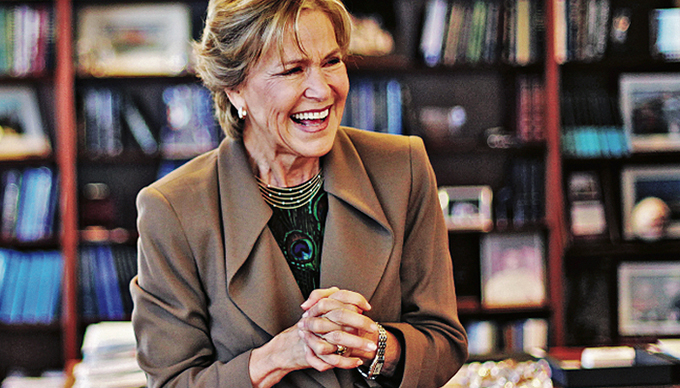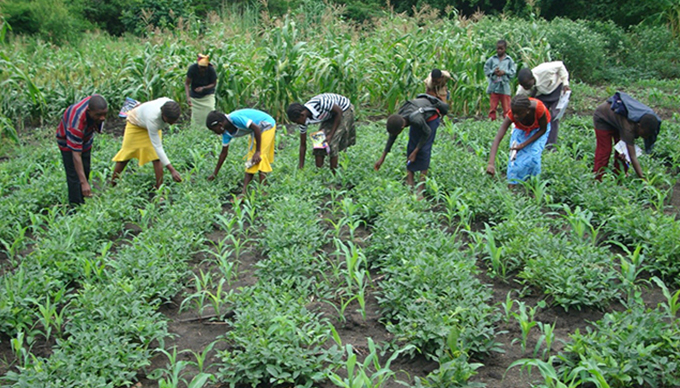When Dr. Rodin was named the 12th president of the Rockefeller Foundation, her charge was to carry the mantle of the Foundation’s first hundred years, and to ensure its future as a force for progress in the 21st century.
At the time, the Foundation was at a crossroads. Accelerating global trends and ground shifts in the marketplace required a new, more strategic approach to philanthropy.
Nearly a century after John D. Rockefeller pledged to “promote the well-being of mankind throughout the world,” Dr. Rodin asked her team a difficult question: How can the Rockefeller Foundation, already one of the largest private foundations in the world, double its impact? Over the next 12 years, they redefined Rockefeller’s approach to philanthropy in a more complex, interconnected, and uncertain environment.
Recognizing that the challenges of the 21st century wouldn’t fit neatly into the Foundation’s existing program-based structure, Rockefeller pioneered an initiative-based model that aggressively infused systems-thinking, innovation, risk-taking, and leverage.
 The Foundation needed the ability to work with urgency, respond rapidly, and course-correct whenever necessary. To meet these challenges, they developed robust, three-to-seven year commitments, creating a more elastic funding model that allowed for closer monitoring, real-time optimization, and eventually helped the Foundation’s programs, grantees, and staff weather the worst economy since the Great Depression.
The Foundation needed the ability to work with urgency, respond rapidly, and course-correct whenever necessary. To meet these challenges, they developed robust, three-to-seven year commitments, creating a more elastic funding model that allowed for closer monitoring, real-time optimization, and eventually helped the Foundation’s programs, grantees, and staff weather the worst economy since the Great Depression.
While the flexibility proved mission critical, it didn’t guarantee world-transformative results. To that end, Rockefeller introduced new types of accountability mechanisms, both for the Foundation and its grantees. Insisting on “measurements that matter,” Dr. Rodin oversaw the development of industry-leading metrics and data tools to help the Foundation measure its progress with accuracy and precision.
Rockefeller also assembled a network of expert problem-solvers, influential decision makers, and private-sector enterprises. These pathbreaking partnerships created the conditions for leverage. For instance, after partnering with the for-profit crowdsourcing company InnoCentive, the Rockefeller Foundation was able to pool research from engineers, scientists, and entrepreneurs from around the world. This innovative mechanism helped connect people who wanted to achieve social change with those who had the technical skills to make it happen.
Amidst these strategic organizational transformations, Dr. Rodin led the Foundation in creating and defining entirely new fields of practice, including resilience, planetary health, impact investing and innovative finance, and universal health coverage.
Under Dr Rodin’s leadership, Rockefeller supported the development of a more coherent, global movement to leverage capital for social good. By recognizing and partnering with companies who demonstrated their commitment to solving major public issues, Rockefeller’s work helped to activate a culture shift across the private sector.
To further define its activities, the Foundation emphasized four overarching issue areas:
Transforming Cities
- The Asian Cities Climate Change Resilience Network Developing resilience interventions and facilitating collaboration among 40 cities in six Asian countries most vulnerable to climate change
- 100 Resilient Cities Helping cities on six continents meet the physical, social, and economic challenges of the 21st century, in an effort that touched billions of lives
- The NYS2100 Commission Co-chairing Governor Andrew Cuomo’s commission to provide recommendations for rebuilding New York’s infrastructure after Superstorm Sandy
Securing Livelihoods
- Sustainable Employment in a Green US Economy (SEGUE) Increasing the quality, quantity, and accessibility of good-paying green jobs in the United States
- Smart Power for Rural Development Electrifying thousands of rural villages in India with off-grid alternative energy, providing opportunities to jump-start rural economic growth across the subcontinent
- Digital Jobs Africa Established inclusive hiring practices for disadvantaged youth in Africa, creating a pipeline from classrooms for tech and digital skills to jobs in Africa’s information and communications technology sector.
- 100,000 Opportunities Initiative A partnership to hire and train more than 100,000 “opportunity youth” in the US —young people who are often from low-income communities of color—to address critical needs in the job market
 Revaluing Ecosystems
Revaluing Ecosystems
- The Alliance for a Green Revolution in Africa (AGRA) Investing in sustainable agriculture, promoting incomes for smallholder farmers, and improving food security across the continent
- YieldWise Reducing food waste in Africa and other regions of the developing world by increasing the production of low-cost crops, improving on-farm storage and processing, creating more local markets, and providing smallholder farmers with greater access to global markets—while simultaneously reducing food waste in the developed world by working with supermarkets, hotels, and restaurants to reduce waste, and motivating individuals to change their behavior.
Promoting Health
- Transforming Health Systems Increasing the accessibility of more equitable, high-quality health services across the developing world
- The Joint Learning Network Convening global leaders to exchange ideas, challenges, and best practices as they work toward universal health coverage

